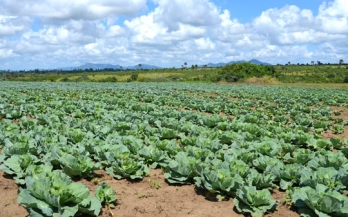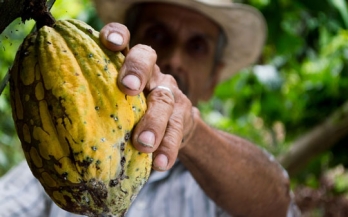This report presents the findings of a Large Country-Lot Quality Assurance Sampling (LC-LQAS) survey that was conducted to evaluate the current coverage and impact of the national flour fortification programme (NFFP) after five years of implementation of the NFFP. The LC-LQAS method was used to design a sample that was representative nationally and within the programme catchment areas.
This report covers the mapping of the distribution, value chain and reach analysis of Alves and includes inputs taken from observations on local markets and at local stores, price checks and interviews done with participants at all levels of the meat processing production and distribution value chain.
This case study assesses the extent to which GAIN’s inputs to Vegman, a vegetable and fruit producer in Chimoio, Manica Provice, Mozambique via the Marketplace for Nutritious Foods program have helped improve availability, affordability, ease of access, convenience and desirability of nutritious food products in local food markets.
This report summarises the findings of the 2010 micronutrient survey conducted in Jordan in March and April 2010. The survey follows an earlier micronutrient survey conducted in 2002, four to five months after the start of a national flour fortification program.
In 2014, a national survey on iodine coverage and utilisation was conducted in Senegal to better understand factors associated with access to adequately iodised salt, and to provide an evidence base from which to plan, monitor and evaluate a revised strategy for achieving optimal iodine nutrition.
This research brief summarizes findings from the national cold chain capacity mapping of Nigeria, conducted between December 2017 and February 2018. Despite having the largest economy in Africa, Nigeria has among the world’s highest burdens of malnutrition. Improving supply chain infrastructure and food storage practices has the potential to significantly reduce postharvest losses and waste across the country.
This report is the outcome of a desk research to assess the nutritional status and underlying causes among cocoa farming families in Côte d'Ivoire commissioned by the Sustainable Trade Initiative for their programme on the Cocoa Learning and Innovation Programme.
The Seeds of Prosperity programme works through commodity supply chains to improve workers’ diets and hygiene practices. This brief present results and next steps from programme evaluations in three sites across India and Kenya. Evaluations found improvements to dietary diversity, handwashing practices, and perceptions of trust for the programme among target groups.
This brief provides an overview of the Seeds of Prosperity programme. Through the Seeds of Prosperity the Global Alliance for Improved Nutrition (GAIN), the Sustainable Trade Initiative (IDH), and Unilever are working through commodity supply chains to improve workers’ diets and hygiene practices.
Vietnamese Living Standard Surveys showed that the rate of overweight and obese in Vietnamese adults doubled between 1992 and 2002. Considering the increasing public health concern over the double burden of malnutrition in Vietnam, we investigated micronutrient deficiencies among women of reproductive age according to their Body Mass Index.










